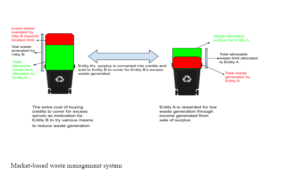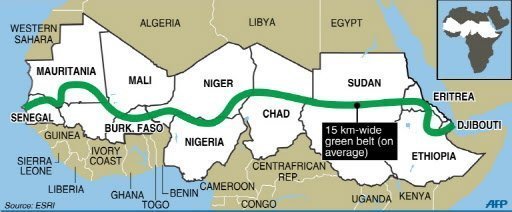
The current state of waste management in Nigeria is a major concern due to the high rate of waste generation and poor management practices, coupled with the high rate of population increase. Nigeria produces an estimated 32 million tons of solid waste per year, with only about 20-30 percent of it being collected and managed correctly. The remainder of the waste is either dumped in unauthorised places or burned, contributing to pollution and health risks.
Nigeria is the largest producer of solid waste in Africa, with approximately 70 percent of it being plastic waste that ends up in landfills, water bodies, or sewers. According to the World Bank, Nigeria ranks as the tenth-largest producer of unmanaged plastic waste globally, accounting for 2.7 percent of the total. Moreover, the World Bank projects that Nigeria will become the largest generator of unmanaged plastic waste in Africa by 2050.
The consequences of improper waste management are dire, ranging from air and water pollution to soil contamination and the depletion of natural resources.
The limited number of recycling facilities further compounds the problem. While recycling is recognised as a crucial component of sustainable waste management, many states and cities lack sufficient infrastructure to effectively sort, process, and recycle waste. As a result, a significant portion of recyclable materials ends up in landfills or incinerators, exacerbating environmental degradation and wasting valuable resources that could be reused.
Moreover, the solid waste crisis in these cities is fueled by insufficient public awareness campaigns. Many residents are unaware of the detrimental effects of improper waste disposal on their health and the environment. The absence of comprehensive education and outreach programs limits public participation in waste management efforts. As a result, individuals may not prioritise waste reduction, separation, and recycling, leading to increased waste generation and further strain on the already overburdened waste management system.
The consequences of neglecting the solid waste crisis are severe and wide-ranging. Air pollution is a significant concern, as uncontrolled waste burning releases harmful pollutants into the atmosphere, compromising air quality and contributing to respiratory illnesses. Water pollution is another critical issue, as leachate from poorly managed landfills can contaminate groundwater sources, posing risks to both human health and ecosystems. Soil contamination can occur when hazardous waste is not properly disposed of, leading to long-term ecological damage and potential health hazards for agricultural activities.
In the face of the mounting solid waste problem in these cities, it is crucial to explore innovative approaches that go beyond traditional solutions. One such approach is the implementation of a market-based mechanism, similar to
emission trading, which has the potential to revolutionise waste management practices and drive a sustainable transformation in these cities.
The concept of a market-based mechanism for waste management is inspired by the success of “Cap and Trade” emission trading schemes, such as the European Union Emission Trading Scheme (EU-ETS), which have been effective in reducing greenhouse gas emissions. By applying a similar framework to solid waste, state or municipal governments can create a marketplace for waste credits, introducing economic incentives to encourage waste reduction, recycling, and responsible disposal practices.
The first step in implementing this mechanism would involve the establishment of a regulatory body responsible for determining the maximum allowable waste production levels for businesses, communities, and households in these cities, known as capping. These limits or caps would be translated into waste credits, which would then be allocated to entities based on their waste production history and other relevant factors. This allocation process ensures fairness and provides a baseline for entities to work towards reducing their waste.
Crucially, these waste credits would be tradable among entities and communities within these cities. This means that entities or communities that successfully reduce their waste below their allocated credits can sell their surplus credits to other entities struggling to meet their waste targets. This creates a market where the economic value of waste reduction is recognised and rewarded. Entities or communities that exceed their allocated credits would face financial penalties, further incentivising them to adopt more sustainable waste management practices.
To ensure the integrity of the waste credit market, a robust monitoring and verification system would be established. This system would include periodic waste audits, supported by advanced technologies and thorough inspections, to track waste generation, disposal practices, and recycling efforts. Compliance with waste reduction targets and transparent reporting would be essential to maintain trust and credibility within the market.
Implementing a market-based mechanism for waste management offers several significant benefits. Firstly, it incentivises waste reduction by assigning a financial value to neighbourhoods that actively work to reduce their waste. Businesses and households would be motivated to adopt sustainable waste management practices to gain valuable waste credits, leading to a substantial reduction in overall waste generation across the state.
Furthermore, this approach encourages innovation and investment in waste management technologies and infrastructure. The prospect of trading waste credits creates a market opportunity for businesses and entrepreneurs to develop and implement new recycling methods, waste-to-energy solutions, and other sustainable practices. This surge in innovation attracts investment, fosters economic growth, and generates job opportunities in the waste management sector.
A market-based mechanism also amplifies public participation and awareness in waste management. Individuals and communities would actively seek ways to reduce waste to gain waste credits, fostering a culture of waste reduction and resource conservation. This collective effort from citizens contributes to a cleaner environment and enhances the overall quality of life in the cities.

Market-based waste management system
Importantly, the implementation of a market-based approach would significantly improve environmental and public health outcomes. By effectively managing waste through waste reduction, recycling, and responsible disposal practices, the state can mitigate air and water pollution, reduce soil contamination, and minimise the depletion of natural resources. This, in turn, promotes a healthier environment for residents and safeguards public health.
In conclusion, a market-based mechanism holds great potential in tackling the solid waste crisis in Nigeria’s urban centres. By creating a marketplace for waste credits, state governments can incentivise waste reduction, encourage innovation, foster public participation, and improve environmental and public health outcomes. As the relevant authorities consider this novel approach, it has the opportunity to become a trailblazer in effective waste management, setting an example for other regions to follow. Through this transformation, states can forge a path towards a cleaner, more sustainable future.
Finally, while market-based solutions offer innovative ways to address solid waste challenges, they are not without limitations, especially when it comes to practical implementation. Hence, effective implementation requires careful consideration of the local context, equity, regulatory frameworks, and the specific waste management context of the areas where they are implemented.

